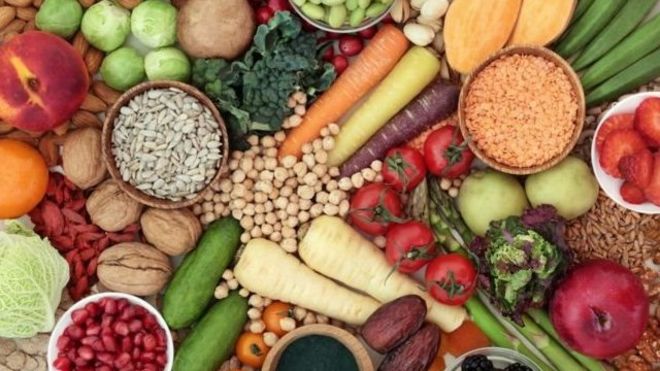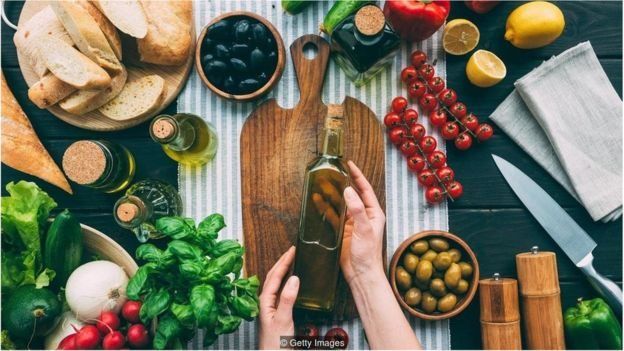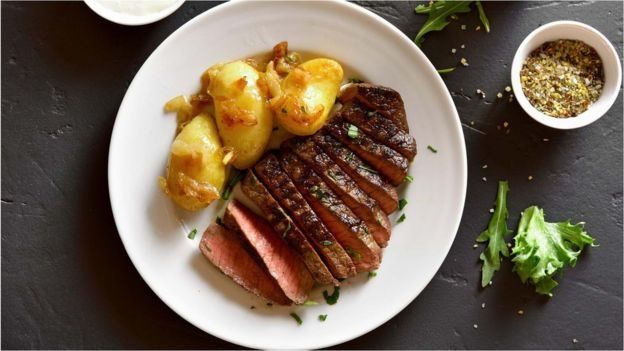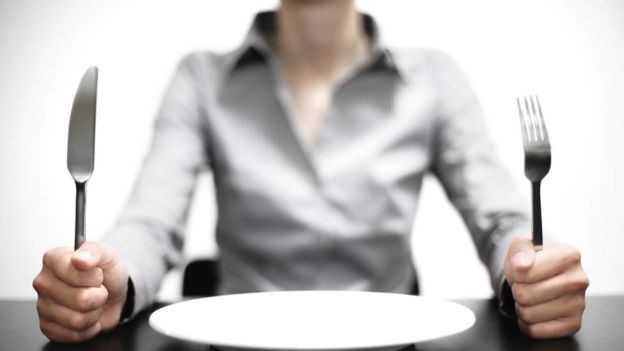飲食與健康:素食與純素食者中風風險或許更高
 圖片版權 Getty Images
圖片版權 Getty Images
近年來,越來越多的人開始成為素食者,因為人們覺得以素食為主的飲食更加健康。
但英國最近一項研究顯示,那些素食與純素食者中風的風險可能會更高。
該項研究結果發表在《英國醫學雜誌》上。 研究人員跟蹤了近5萬人,曆時18年之久。
研究發現,同肉食者相比,素食和純素食者每1000人中會增加3例中風病例。
與此同時,同肉食者相比,在素食和純素食者中,心髒病病例每1000人中則減少10例。
在長達18年的隨訪中,誌願者需要填寫他們每天的飲食、醫療史、是否吸煙以及每天的活動量等。
在調查過程中,誌願者中有近3000人得了冠心病、1000多人中風,其中包括300例腦溢血。
雖然,那些隻吃魚類產品、素食和純素食誌願者中患心髒病的比例比食肉誌願者低,但他們中風風險卻比食肉者高出20%。
其中原因
 圖片版權 Getty Images
圖片版權 Getty Images
這到底是為什麽呢?
研究人員認為,這可能與素食者體內維生素B12水平較低有關。但科研人員說,對此還需要進一步的研究。
然而,該研究無法證明它是否完全取決於飲食或者與其他生活方式不同有關?
同時,還有一種可能性是它跟人們的飲食毫無關係。很可能是不吃肉的人生活方式與肉食者大相徑庭的緣故。
因果關係
 圖片版權 Getty Images
圖片版權 Getty Images
那麽,這是否意味著素食和純素食飲食不健康呢?
英國營養協會的菲利普博士認為,不應該這樣理解。她說,雖然二者之間有聯係,但並不是因果關係。
菲利普博士表示,它給人們傳達的一個最重要的信息是,要均衡飲食,食物種類越多越好。
但她也指出,那些以肉食為主的人也要注意,並不是他們的飲食就保險。因為有些肉食者進食種類很單一,比如,每晚隻吃肉和土豆,不吃蔬菜。顯然,這也不是最佳飲食。
飲食變化
由於該調查數據跨越了近20年,在這期間人們的飲食也在不斷發生變化。
例如,菲利普博士說,今天素食者和純素食者的飲食與20、30年前素食者的食譜相比已經大不相同。
不但如此,菲利普博士表示,今天人們對食用加工食品及紅肉與健康風險之間的聯係有了更多的了解,特別是它與腸癌風險之間的聯係。
飲食均衡
 圖片版權 Getty Images
圖片版權 Getty Images
營養專家認為,無論人們選擇何種飲食,最關鍵的是要多樣化,飲食均衡對健康最有益。
因此,英國NHS在膳食指南(the Eatwell Guide)中希望人們能夠每天:
- 至少吃5份水果和蔬菜
- 主食以高纖維的澱粉食物為主,例如土豆、麵包、米飯和麵食。
- 不要忘了蛋白質食品,包括瘦肉、魚肉、海鮮、豆類、豆腐和無鹽堅果
- 乳製品和乳製品替代產品
- 少量和少吃脂肪、糖或鹽含量較高的食物
 圖片版權 Getty Images
圖片版權 Getty Images
此外,素食者和純素食者還要特別注意吸收某些特定營養,比如膽堿,以保持大腦健康。
膽堿是人體正常生長、發育和維持各項身體功能健康運作的必需營養素,在生長發育過程中扮演著重要角色。
同時,不要忘了維生素B12。
通常,肉食者會從奶製品、肉類和魚類中攝取足夠的維生素B12。維生素B12對維持健康血液和神經係統至關重要。
然而,純素食者中有可能會出現維生素B12不足或低下的情況。
鐵也是一種不太容易從植物性食物中吸收的元素。所以素食者需要確保在飲食中包括全麥麵包和麵粉、幹果和豆類等食品。
相關原始研究鏈接:
https://www.bmj.com/content/366/bmj.l4897
Abstract
Objective To examine the associations of vegetarianism with risks of ischaemic heart disease and stroke.
Design Prospective cohort study.
Setting The EPIC-Oxford study, a cohort in the United Kingdom with a large proportion of non-meat eaters, recruited across the country between 1993 and 2001.
Participants 48 188 participants with no history of ischaemic heart disease, stroke, or angina (or cardiovascular disease) were classified into three distinct diet groups: meat eaters (participants who consumed meat, regardless of whether they consumed fish, dairy, or eggs; n=24 428), fish eaters (consumed fish but no meat; n=7506), and vegetarians including vegans (n=16 254), based on dietary information collected at baseline, and subsequently around 2010 (n=28 364).
Main outcome measures Incident cases of ischaemic heart disease and stroke (including ischaemic and haemorrhagic types) identified through record linkage until 2016.
Results Over 18.1 years of follow-up, 2820 cases of ischaemic heart disease and 1072 cases of total stroke (519 ischaemic stroke and 300 haemorrhagic stroke) were recorded. After adjusting for sociodemographic and lifestyle confounders, fish eaters and vegetarians had 13% (hazard ratio 0.87, 95% confidence interval 0.77 to 0.99) and 22% (0.78, 0.70 to 0.87) lower rates of ischaemic heart disease than meat eaters, respectively (P<0.001 for heterogeneity). This difference was equivalent to 10 fewer cases of ischaemic heart disease (95% confidence interval 6.7 to 13.1 fewer) in vegetarians than in meat eaters per 1000 population over 10 years. The associations for ischaemic heart disease were partly attenuated after adjustment for self reported high blood cholesterol, high blood pressure, diabetes, and body mass index (hazard ratio 0.90, 95% confidence interval 0.81 to 1.00 in vegetarians with all adjustments). By contrast, vegetarians had 20% higher rates of total stroke (hazard ratio 1.20, 95% confidence interval 1.02 to 1.40) than meat eaters, equivalent to three more cases of total stroke (95% confidence interval 0.8 to 5.4 more) per 1000 population over 10 years, mostly due to a higher rate of haemorrhagic stroke. The associations for stroke did not attenuate after further adjustment of disease risk factors.
Conclusions In this prospective cohort in the UK, fish eaters and vegetarians had lower rates of ischaemic heart disease than meat eaters, although vegetarians had higher rates of haemorrhagic and total stroke.
Fig 1
Rates of ischaemic heart disease and stroke in fish eaters and vegetarians (including vegans) compared with meat eaters in the EPIC-Oxford study (n=48 188). Meat eaters were participants who reported eating meat, regardless of whether they ate fish, dairy, or eggs; fish eaters were participants who did not eat meat but did eat fish; and vegetarians included vegans. Meat eaters were used as the reference group throughout. All analyses included age as the underlying time variable; were stratified by sex, method of recruitment (general practice or postal), and region (seven categories); and were adjusted for year of recruitment (per year), education (no qualifications, basic secondary (eg, O level), higher secondary (eg, A level), degree, unknown), Townsend deprivation index (quarters, unknown), smoking (never, former, light, heavy, unknown), alcohol consumption (<1, 1-7, 8-15, ≥16 g/day), physical activity (inactive, low activity, moderately active, very active, unknown), dietary supplement use (no, yes, unknown), and oral contraceptive and hormone replacement therapy use in women. P heterogeneity=significance of heterogeneity in risk between diet groups based on Wald tests. Box sizes are proportional to the number of cases in each group
